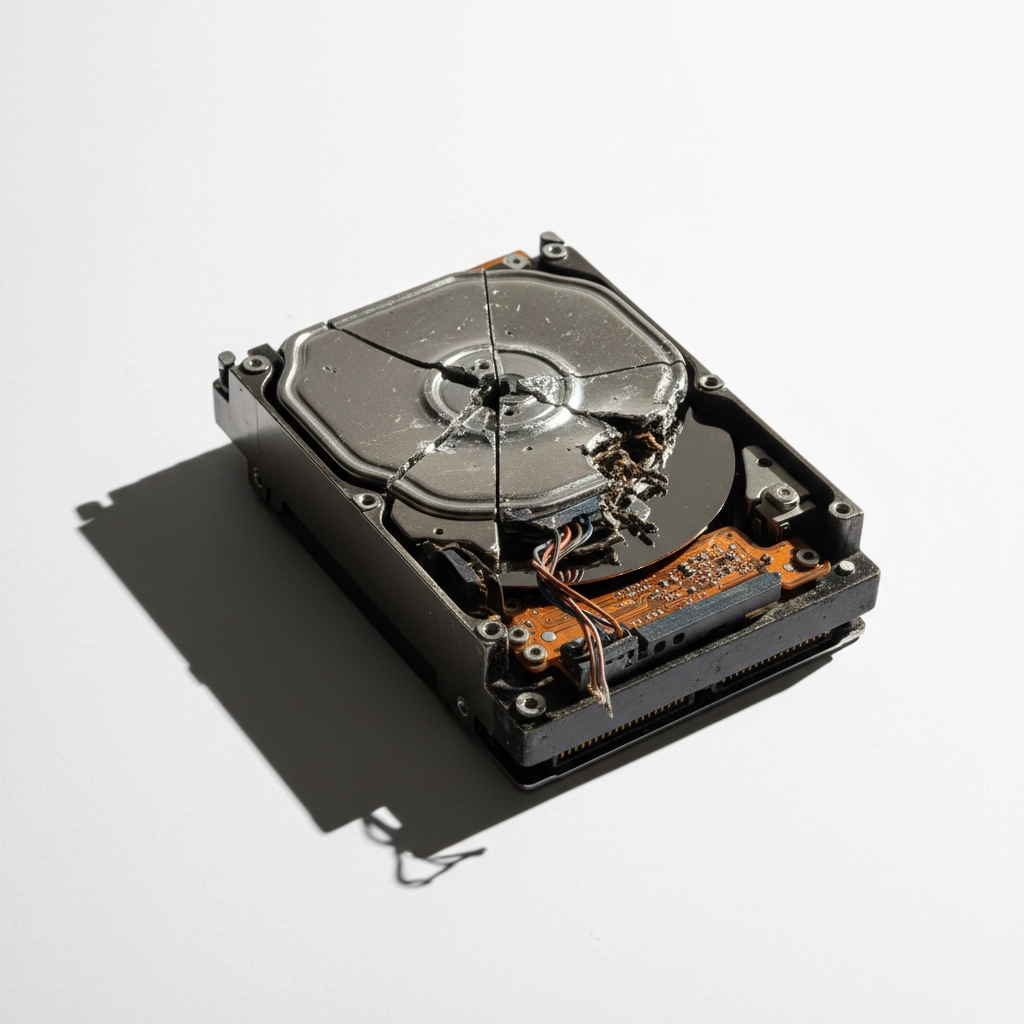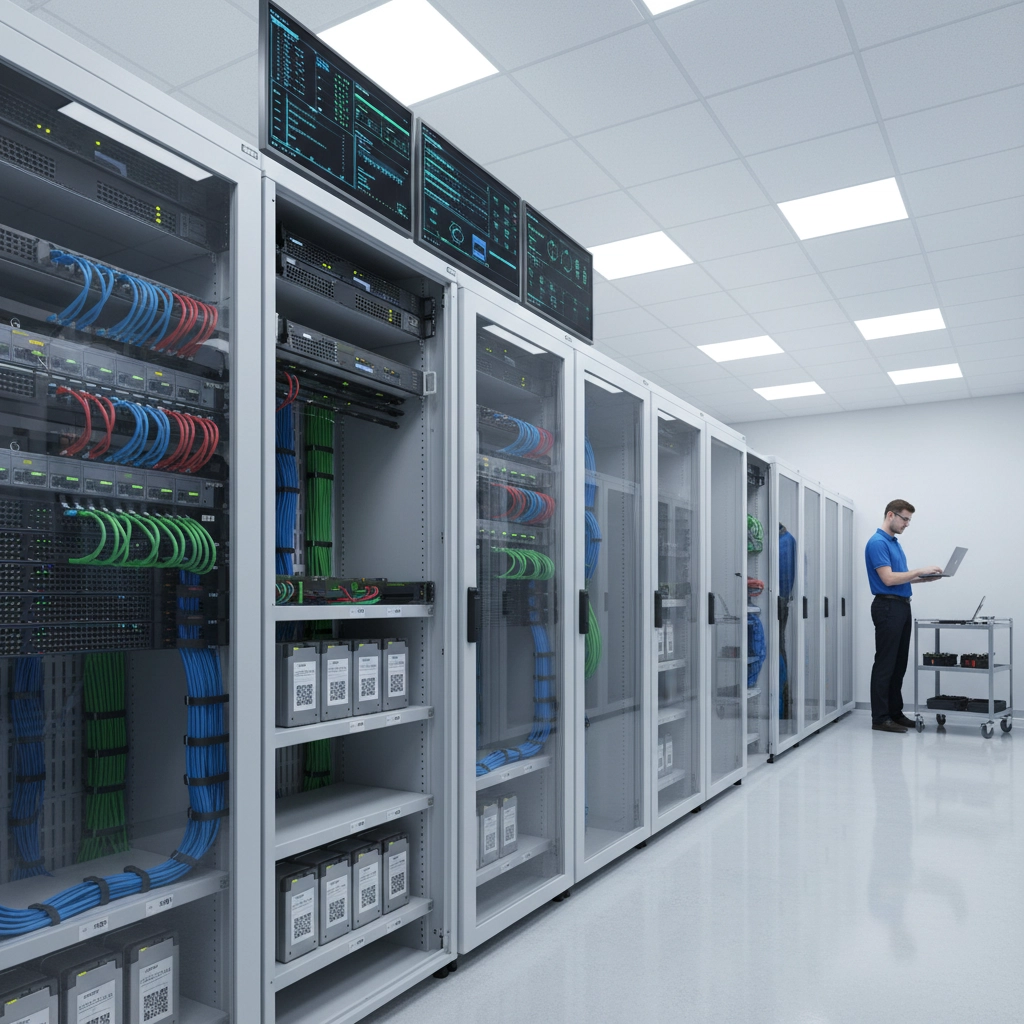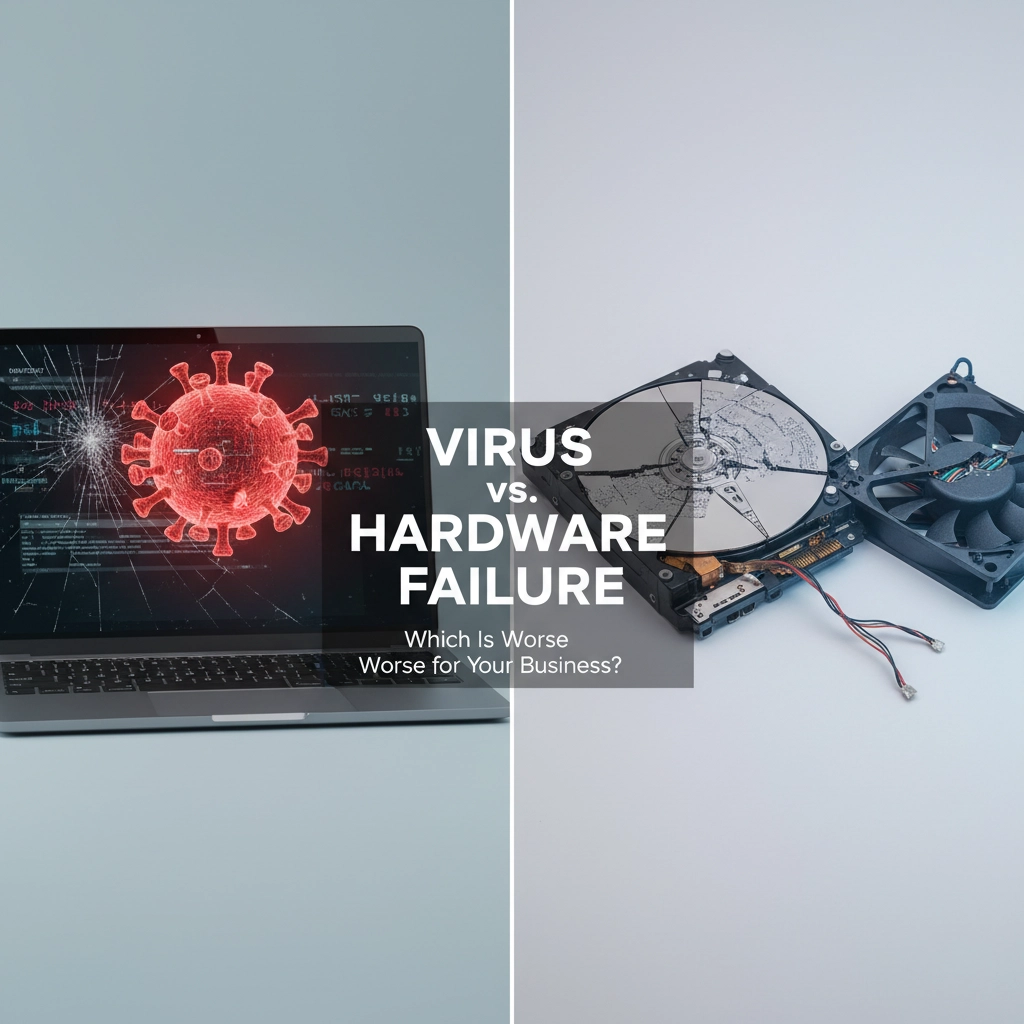Picture this: you're running your Peterborough business on a Tuesday morning when suddenly your computer starts acting weird. Files won't open, programs crash, and your team can't get any work done. Is it a virus wreaking havoc on your system, or did your hard drive just give up the ghost?
Both scenarios are nightmares for any business owner, but they're completely different kinds of nightmares. As someone who's seen both destroy businesses here in New Hampshire, I can tell you that understanding the difference could save you thousands of dollars and weeks of headaches.
Let's break down which threat should keep you up at night and what you can actually do about it.
When Viruses Attack: The Silent Destroyer
Viruses and malware are sneaky little troublemakers. Unlike a hardware failure that announces itself with grinding noises or a blue screen, viruses often work in the shadows for days or weeks before you notice anything's wrong.
Here's how it typically plays out: One of your employees clicks on what looks like a legitimate email attachment. Maybe it's a fake invoice or a "urgent" document that seems work-related. Within minutes, that virus is spreading through your network like wildfire.

The real nightmare begins when you discover the infection has already spread to your backup systems. This is where most businesses learn a harsh lesson about network isolation the hard way. If your backups are connected to your main network (which many are, for convenience), they become infected too.
When this happens, recovery becomes a complete rebuild project. Your IT team has to:
- Wipe and rebuild servers from scratch
- Import data files one at a time
- Scrub every single file to ensure it's clean
- Reconnect and reconfigure all workstations
- Test everything to make sure the infection is completely gone
This process typically takes 1-5 days for the initial rebuild, but full recovery can stretch for weeks as you restore all your systems and workflows. Meanwhile, your business is essentially paralyzed.
The psychological impact hits hard too. Your customers start questioning your security practices, and your team loses confidence in the systems they depend on daily. That trust takes time to rebuild.
Hardware Failure: The Sudden Stop
Hardware failures are the opposite of viruses in many ways. When a hard drive crashes or a motherboard fries, you know immediately. Your computer simply stops working, often without warning.

The most devastating hardware failure is a complete hard drive crash. If this happens and your backups aren't current (or worse, aren't working), you're looking at a potential business disaster.
In the worst-case scenario, you'll need data forensics to attempt recovery. This process costs $20,000 or more with absolutely no guarantee of success. It can take 1-4 weeks, during which your entire business can't produce work, service clients, or even send emails.
Here's a sobering fact: most hard drives fail within three years. That means every year your hardware ages, your risk increases significantly. Unlike viruses, which you might be able to prevent with good security practices, hardware failure is inevitable: it's just a matter of when.
Hardware failures come in three levels of severity:
- Minor: Loss of data currently being worked on
- Major: Widespread corruption affecting recent files and changes
- Catastrophic: Complete data loss requiring full system restoration
The financial impact extends beyond just the recovery costs. You're looking at lost productivity, missed deadlines, unhappy customers, and potentially legal issues if you can't fulfill contracts or protect client data.
The Head-to-Head Comparison
Let me lay out how these threats stack up against each other:
Speed of Detection
- Viruses: Often go undetected for days or weeks, giving them time to spread and corrupt backups
- Hardware Failure: Immediate and obvious: your computer just stops working
Recovery Complexity
- Viruses: Requires complete system rebuild and file-by-file cleaning, 1-5 days plus weeks for full recovery
- Hardware Failure: Can range from simple restoration to expensive forensic recovery taking 1-4 weeks
Backup Vulnerability
- Viruses: High risk of corrupting backup systems if they're network-connected
- Hardware Failure: Backups remain safe if properly stored separately
Financial Cost
- Viruses: Recovery labor, extended downtime, potential reputation damage
- Hardware Failure: Forensic recovery ($20,000+), replacement hardware, business interruption
Prevention Difficulty
- Viruses: Requires ongoing vigilance, employee training, and centralized security management
- Hardware Failure: Predictable through monitoring and proactive replacement schedules

So Which Is Actually Worse?
The answer depends on your specific situation, but here's my take after helping New Hampshire businesses deal with both for years:
For most small businesses, hardware failure is worse because it's more likely to result in complete data loss. While viruses are scary, they usually don't destroy your actual data: they just make it inaccessible or corrupt some files. A catastrophic hard drive failure, on the other hand, can wipe out years of work in an instant.
However, viruses become worse if you don't have proper backup isolation. If a virus can reach your backups, you're essentially facing the worst of both worlds: data corruption plus the inability to restore from clean backups.
Real-World Prevention That Actually Works
Based on what I've seen work for businesses right here in the Monadnock region, here's what you need to focus on:
For Hardware Protection:
- Replace hard drives proactively before they hit the 3-year mark
- Implement automated, isolated backups that run daily
- Use surge protectors and maintain proper ventilation
- Monitor drive health with built-in diagnostic tools
For Virus Protection:
- Install centralized antivirus management across all computers
- Train employees to recognize suspicious emails and attachments
- Keep all software and operating systems updated
- Segment your network so an infected computer can't reach servers

The Best Defense Strategy:
Don't choose between protecting against one or the other: you need both. The absolute worst scenario combines them: a virus corrupts your backups, then hardware fails, forcing you into expensive forensic recovery with no guarantee of success.
When to Call for Professional Help
Some warning signs that you need expert assistance:
- Your backups haven't been tested in over six months
- You're not sure if your antivirus is actually working on all computers
- Any computer in your office is more than three years old without recent backup verification
- You've noticed any unusual computer behavior, even if it seems minor
- Your team is working on critical projects without recent backups
The Bottom Line for New Hampshire Businesses
Both viruses and hardware failures can devastate your business, but hardware failure typically causes more permanent damage. The key is having proper backup systems that are isolated from your network, so they can't be corrupted by viruses but can still restore your data when hardware inevitably fails.
At Preferred Computer Solutions, we've helped countless local businesses recover from both scenarios. The companies that bounce back quickly are always the ones who had proper backup systems in place before disaster struck.
Don't wait until you're facing a crisis to address these risks. Whether it's a virus spreading through your network or a hard drive that decides to give up on a busy Monday morning, the time to prepare is now.

Your business data is irreplaceable. Your time is valuable. And your customers expect you to be reliable. Protecting against both viruses and hardware failure isn't just good IT practice: it's essential business insurance.
If you're not confident about your current protection against both threats, it's worth having a professional assessment. Because when it comes to business continuity, it's not a matter of if these problems will occur, but when.



Recent Comments